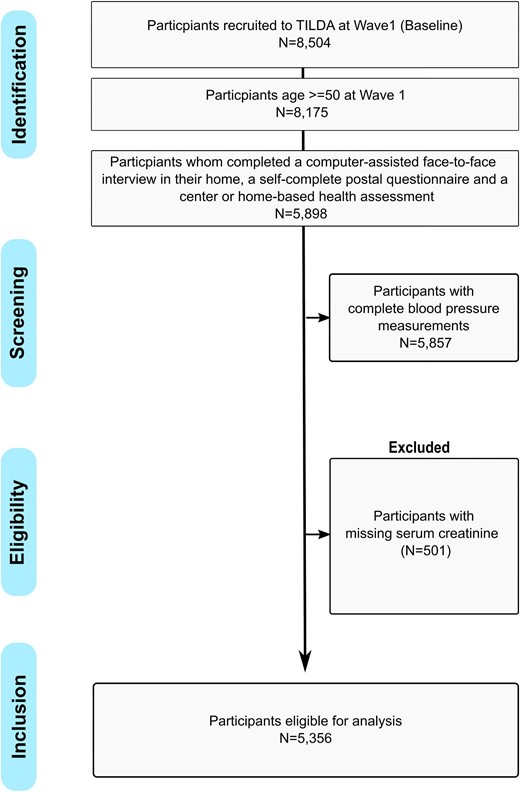2024-08-08 アイルランド・リムリック大学(UL)
<関連情報>
- https://www.ul.ie/news/ul-research-reveals-poor-control-of-high-blood-pressure-in-adults-with-kidney-disease
- https://academic.oup.com/ckj/article/17/8/sfae184/7700718
慢性腎臓病を有する地域在住高齢者における高血圧の有病率、認知、治療、コントロール:アイルランドの高齢化に関する縦断的研究 Prevalence, awareness, treatment, and control of hypertension in community-dwelling older adults with chronic kidney disease: the Irish longitudinal study on ageing
Leonard D Browne, Mohammed Y Alamin, Hamid H Miri, Robert Hall, Meera Tandan, Donal Sexton, Austin G Stack
Clinical Kidney Journal Published:27 June 2024
DOI:https://doi.org/10.1093/ckj/sfae184

ABSTRACT
Background
Hypertension is highly prevalent in chronic kidney disease (CKD), posing a significant but modifiable risk for adverse clinical outcomes. This study explored the prevalence, awareness, treatment, and control of hypertension in older Irish adults with CKD.
Methods
Data were analysed from participants in Wave 1 of The Irish Longitudinal Study on Ageing (TILDA) who were aged 50 years and older. CKD was defined as eGFR <60 ml/min/1.72 m2, hypertension defined as systolic blood pressure (SBP) ≥140 mmHg and/or diastolic blood pressure (DBP) ≥90 mmHg and/or self-reported use of antihypertensive medication. Participant awareness and treatment of hypertension was based on self-report and SBP/DBP <140/90 mmHg. Multivariable logistic regression examined relationships with awareness, treatment, and control of hypertension expressed as adjusted odds ratios.
Results
Prevalence of hypertension was significantly higher in participants with CKD than without (81.9% vs 59.7%, P < .001). Among hypertensive individuals, 70.1% (95% CI: 65.8–74.1) were aware, 83.5% (95% CI 80.0–86.6) were on treatment, yet blood pressure control <140/90 mmHg and SBP <120 mmHg were achieved in only 49.3% (CI 44.0–54.7%) and 17.9% (CI 14.4–22.1), respectively. In multivariable analysis, advancing age 1.05 (CI 1.01–1.10), obesity 6.23 (CI 2.51–15.5), diabetes 5.78 (CI 1.55–21.5), and cardiovascular disease 9.89 (CI 3.27–29.9) were associated with higher odds of treatment, while cardiovascular disease 2.35 (CI 1.39–3.99) and combination antihypertensive therapy 1.76 (CI 1.03–3.01) were associated with blood pressure control.
Conclusion
The prevalence of hypertension is substantial in older Irish adults with CKD; however, control is poor. Approximately, one-third of participants were unaware of their hypertensive status and approximately one-fifth were untreated.
KEY LEARNING POINTS
- Prevalence of hypertension among older Irish adults with CKD is high (81.9%).
- Treatment with multiple antihypertensive medications is common in CKD patients, yet a significant proportion are undertreated.
- Despite high awareness and treatment rates (70.1% and 83.5%, respectively), blood pressure control is poor (49.3% achieving <140/90 mmHg, 17.9% achieving systolic blood pressure <120 mmHg).
What was known?
- Hypertension prevalence is high in CKD patients, yet specific data for older Irish adults were lacking.
- Previous studies indicated suboptimal hypertension management in CKD, necessitating further investigation.
- Limited awareness, treatment, and control of hypertension in CKD pose significant challenges to patient outcomes.
This study adds:
- High prevalence and poor control of hypertension in older Irish adults with CKD.
- Treatment with multiple antihypertensive medications is common in CKD patients, yet a significant proportion remain undertreated.
- Achievement of recommended blood pressure targets is challenging in CKD, particularly in the elderly.
Potential impact:
- The findings underscore the need for more robust quality improvement programmes to improve blood pressure control in CKD.
- The inclusion of hypertension in the new national Structured Chronic Disease Management (CDM) Programme in Ireland should serve to improve the quality of CKD care in these patients.


